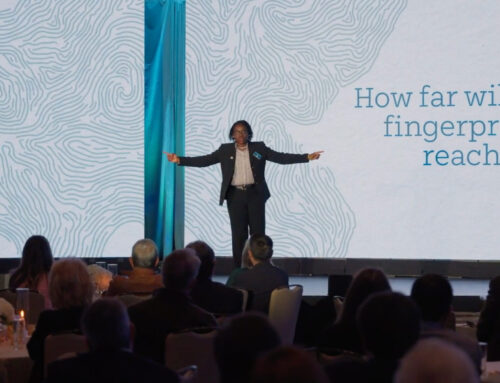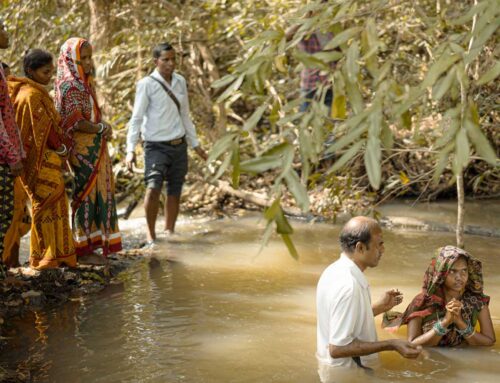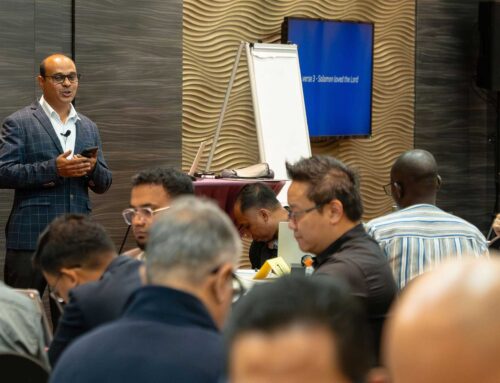Thought Leadership: Vulnerable Witnesses
In his recent book called The Unexpected Christian Century, missions scholar Scott Sunquist notes two central and surprising facts about Christianity in the twentieth century. First, Christianity grew in non-Western parts of the world while it declined in the West. Second, government support for Christianity declined around the world even as the faith grew. Haggai leaders have stood at the center of this shift, seeing the Gospel flourish in places of great vulnerability and need.
Our leaders are proclaiming and demonstrating the Gospel in nations recently cited by the US Commission on International Religious Freedom as “countries of particular concern,” nations like Turkmenistan, Myanmar, Iran, and India. For Christian women, persecution is often experienced as sexual violence and forced marriage, for men, as exclusion from economic and social systems and physical violence.* In some places, persecution leads to growth of the faith (typically when persecution is mild and sporadic). In other places, high levels of sustained persecution can nearly destroy the Church, like in Afghanistan under the Taliban in the 1980s and 1990s. Gospel witness is a vulnerable witness, as we follow our servant Lord into a world full of anti-Gospel forces that resist the reign of Jesus Christ and his new way of relating to God and neighbor. Our leaders embody this way of vulnerable witness, reminding all of us that our faith is grounded not first in governments and human institutions but in the surprising goodness and power of God.
The vulnerable witness of Haggai leaders reminds me of the end of Hebrews, where the author writes to God’s people (including us!): “So Jesus also suffered outside the gate in order to sanctify the people through his own blood.” (And then the unexpected part): “Therefore let us go to him outside the camp, bearing the disgrace he bore.” (Hebrews 13:12-13)** Life with Jesus is life outside the gate. It’s a life in relationship with the God-for-others, not a life using God primarily to protect ourselves. It’s a life lived perpetually “on the way,” with the outcast, the broken, the sinner, together being turned to Christ and seeking “the city that is to come” (see verse 14). We should not romanticize the lives of Haggai leaders ministering on Gospel frontiers. Their lives are filled with tensions and trials, struggles and doubts. Their lives are fragile and vulnerable. But they are with Jesus. They have embraced life with him “outside the gate” and are “seeking the city that is to come.” In embracing the journey to bear witness to the Gospel in a broken world they are examples for us all that our security is found not inside the gate but outside of it, where the renewing power of Jesus is found.
At Haggai, we want our Thought Leadership initiatives to be planted “outside the gate,” with our leaders who have ministered at the center of Christianity’s growth in volatile contexts around the world. We want to draw together their wisdom and their ways of Gospel witness and, ultimately, to share them with the world.
*Source: “A Web of Forces: The 2023 Gender Report,” Open Doors International, 2023.
**Connecting Hebrews 13:12-13 to missions comes from Orlando Costas, Christ Outside the Gate.
Thought Leadership: Vulnerable Witnesses
In his recent book called The Unexpected Christian Century, missions scholar Scott Sunquist notes two central and surprising facts about Christianity in the twentieth century. First, Christianity grew in non-Western parts of the world while it declined in the West. Second, government support for Christianity declined around the world even as the faith grew. Haggai leaders have stood at the center of this shift, seeing the Gospel flourish in places of great vulnerability and need.
Our leaders are proclaiming and demonstrating the Gospel in nations recently cited by the US Commission on International Religious Freedom as “countries of particular concern,” nations like Turkmenistan, Myanmar, Iran, and India. For Christian women, persecution is often experienced as sexual violence and forced marriage, for men, as exclusion from economic and social systems and physical violence.* In some places, persecution leads to growth of the faith (typically when persecution is mild and sporadic). In other places, high levels of sustained persecution can nearly destroy the Church, like in Afghanistan under the Taliban in the 1980s and 1990s. Gospel witness is a vulnerable witness, as we follow our servant Lord into a world full of anti-Gospel forces that resist the reign of Jesus Christ and his new way of relating to God and neighbor. Our leaders embody this way of vulnerable witness, reminding all of us that our faith is grounded not first in governments and human institutions but in the surprising goodness and power of God.
The vulnerable witness of Haggai leaders reminds me of the end of Hebrews, where the author writes to God’s people (including us!): “So Jesus also suffered outside the gate in order to sanctify the people through his own blood.” (And then the unexpected part): “Therefore let us go to him outside the camp, bearing the disgrace he bore.” (Hebrews 13:12-13)** Life with Jesus is life outside the gate. It’s a life in relationship with the God-for-others, not a life using God primarily to protect ourselves. It’s a life lived perpetually “on the way,” with the outcast, the broken, the sinner, together being turned to Christ and seeking “the city that is to come” (see verse 14). We should not romanticize the lives of Haggai leaders ministering on Gospel frontiers. Their lives are filled with tensions and trials, struggles and doubts. Their lives are fragile and vulnerable. But they are with Jesus. They have embraced life with him “outside the gate” and are “seeking the city that is to come.” In embracing the journey to bear witness to the Gospel in a broken world they are examples for us all that our security is found not inside the gate but outside of it, where the renewing power of Jesus is found.
At Haggai, we want our Thought Leadership initiatives to be planted “outside the gate,” with our leaders who have ministered at the center of Christianity’s growth in volatile contexts around the world. We want to draw together their wisdom and their ways of Gospel witness and, ultimately, to share them with the world.
*Source: “A Web of Forces: The 2023 Gender Report,” Open Doors International, 2023.
**Connecting Hebrews 13:12-13 to missions comes from Orlando Costas, Christ Outside the Gate.
Thought Leadership: Vulnerable Witnesses
In his recent book called The Unexpected Christian Century, missions scholar Scott Sunquist notes two central and surprising facts about Christianity in the twentieth century. First, Christianity grew in non-Western parts of the world while it declined in the West. Second, government support for Christianity declined around the world even as the faith grew. Haggai leaders have stood at the center of this shift, seeing the Gospel flourish in places of great vulnerability and need.
Our leaders are proclaiming and demonstrating the Gospel in nations recently cited by the US Commission on International Religious Freedom as “countries of particular concern,” nations like Turkmenistan, Myanmar, Iran, and India. For Christian women, persecution is often experienced as sexual violence and forced marriage, for men, as exclusion from economic and social systems and physical violence.* In some places, persecution leads to growth of the faith (typically when persecution is mild and sporadic). In other places, high levels of sustained persecution can nearly destroy the Church, like in Afghanistan under the Taliban in the 1980s and 1990s. Gospel witness is a vulnerable witness, as we follow our servant Lord into a world full of anti-Gospel forces that resist the reign of Jesus Christ and his new way of relating to God and neighbor. Our leaders embody this way of vulnerable witness, reminding all of us that our faith is grounded not first in governments and human institutions but in the surprising goodness and power of God.
The vulnerable witness of Haggai leaders reminds me of the end of Hebrews, where the author writes to God’s people (including us!): “So Jesus also suffered outside the gate in order to sanctify the people through his own blood.” (And then the unexpected part): “Therefore let us go to him outside the camp, bearing the disgrace he bore.” (Hebrews 13:12-13)** Life with Jesus is life outside the gate. It’s a life in relationship with the God-for-others, not a life using God primarily to protect ourselves. It’s a life lived perpetually “on the way,” with the outcast, the broken, the sinner, together being turned to Christ and seeking “the city that is to come” (see verse 14). We should not romanticize the lives of Haggai leaders ministering on Gospel frontiers. Their lives are filled with tensions and trials, struggles and doubts. Their lives are fragile and vulnerable. But they are with Jesus. They have embraced life with him “outside the gate” and are “seeking the city that is to come.” In embracing the journey to bear witness to the Gospel in a broken world they are examples for us all that our security is found not inside the gate but outside of it, where the renewing power of Jesus is found.
At Haggai, we want our Thought Leadership initiatives to be planted “outside the gate,” with our leaders who have ministered at the center of Christianity’s growth in volatile contexts around the world. We want to draw together their wisdom and their ways of Gospel witness and, ultimately, to share them with the world.
*Source: “A Web of Forces: The 2023 Gender Report,” Open Doors International, 2023.
**Connecting Hebrews 13:12-13 to missions comes from Orlando Costas, Christ Outside the Gate.















